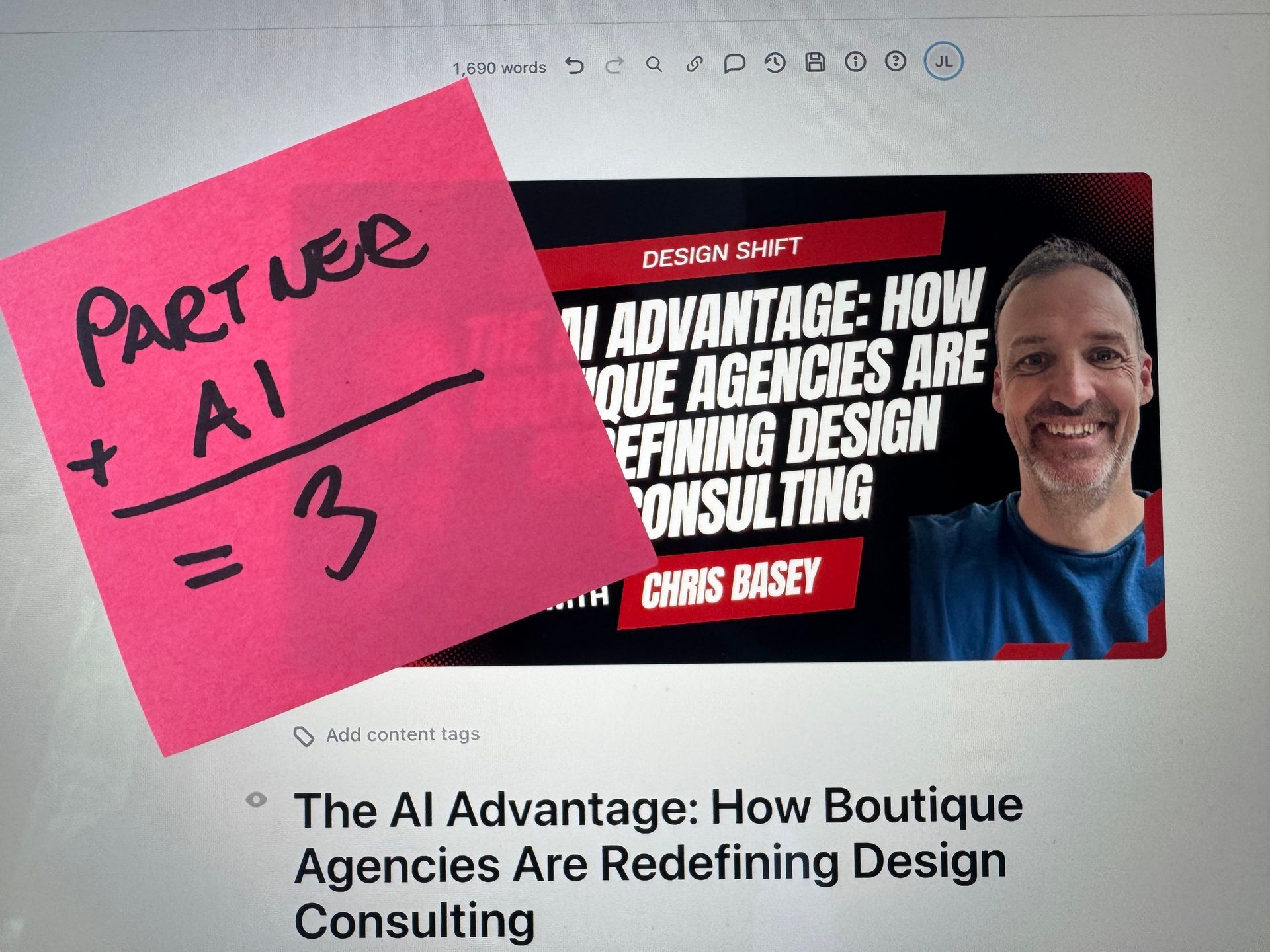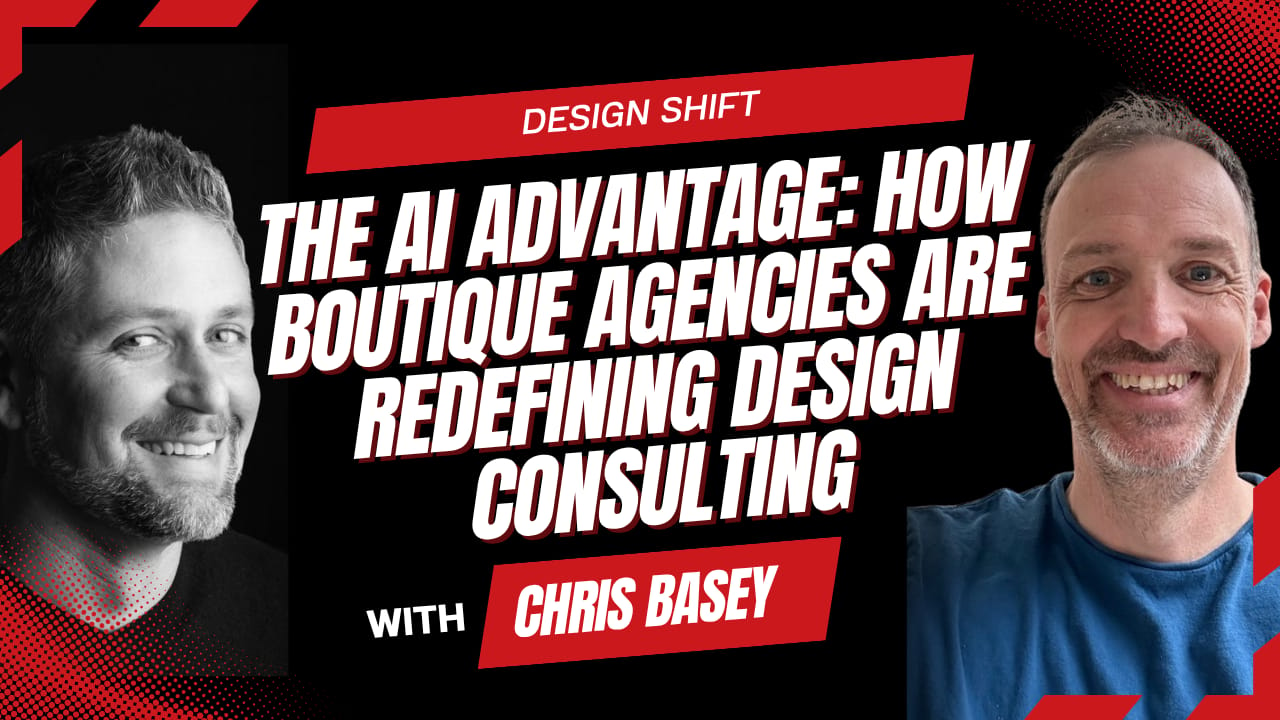
Can a small design team really outpace the Big Four…with just AI and grit?
As I covered in a previous issue of Design Shift, boutique design consultancies are no longer the underdogs; they’re the ones rewriting the rules. In my conversation with my good friend and oft coconspirator/partner, Chris Basey, the CEO of Comedia, he unpacks how small, nimble teams are using AI not to replace designers, but to amplify them. From beating the Big Four by shipping faster to ditching the theater of design thinking in favor of real outcomes, Chris offers a candid look at what it takes to thrive in today’s rapidly evolving landscape. If you want to understand where design is headed—and why AI won’t save you unless you know your fundamentals—this one’s for you.
In this issue/episode:
Read on for my main takeaways from our conversation. 🎧 And…listen to the recording of our full conversation on the Design Shift podcast on Spotify and Apple and the Design Shift YouTube channel.
— Justin Lokitz
Design Deep Dive
Design Thinking…Boutiques…and AI Oh My!
As a former/recovering CEO and cofounder of a boutique consulting agency, a lot of what we talked about in my conversation with Chris resonated…deeply. Chris and I have worked together (as partners) on the front lines of innovation several times. And…every time we have, we have proven that the model of “Doing it Together” proves the equation 1+1=3.
Even after I closed my own consultancy several years ago, I’ve witnessed Chris’s consultancy, Comedia, expand to take on new clients, new projects, and…new ways of working, even with a smaller team. That’s why I was so excited to speak with him. I hope you get as much out of this conversation as I did!
Here are the three biggest takeaways from our conversation…
Insight 1: Boutique Agencies Win by Doing the Work…and Doing It Together
It’s a misnomer to think that boutiques are just small versions of the big four consultancies, always reaching for scale by adding headcount in the form of junior associates. In fact, this is often not the case at all. Boutique consultancies/agencies scale by deepening relationships and showing up differently.
For Chris, the secret is in execution and collaboration: “We won that out… because we showed up with a willingness to understand their problem with a solution set that addressed those things quickly… and we produced an actual option.”
That mindset—a bias toward action—helped Comedia win business against one of the Big Four. While the larger firm brought in a static slide, Comedia brought a working prototype, built in less than 12 hours.
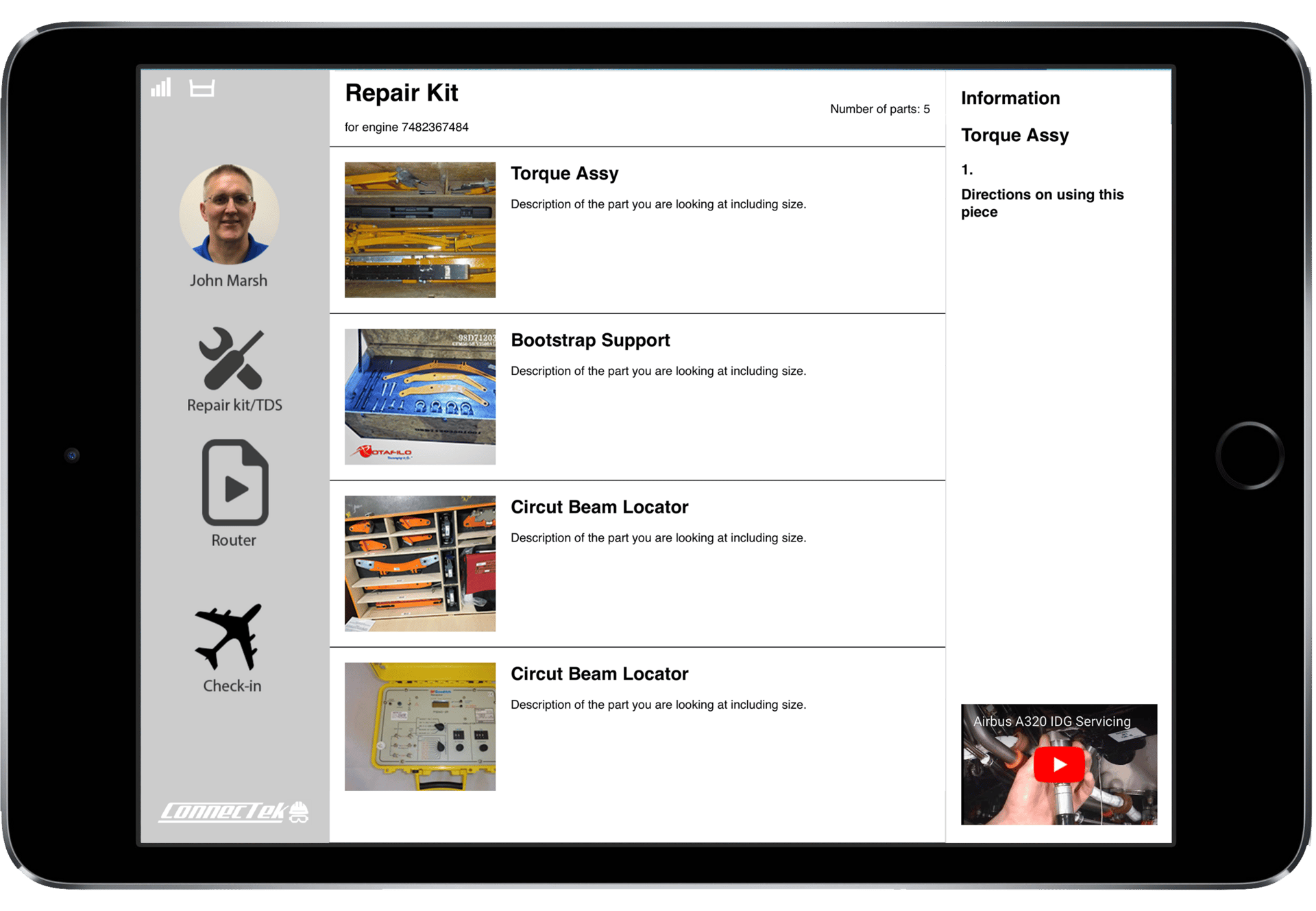
Working prototype Comedia co-created with BMI US for a client…during a 1-day sprint
As Chris stated, “This is the speed we can work at. This is the thinking we have. We’ll go from zero to one faster than anyone else.”
But Chris is quick to point out: this pace isn’t powered by chaos; it’s enabled by tight teams, genuine networks, and a different way of thinking about growth. Rather than add headcount, Comedia is investing in networks of like-minded studios: “Now boutique agencies… have a core of world-class people… and then find other agencies who do similar but different work… acting together as a bigger agency.”
The result is flexible scale: a responsive model that allows firms like Comedia to punch above their weight while still staying nimble. Chris sees this as the future of design and consulting alike.
“You don’t need to be all things to everyone. Find what you’re great at—and find others who are great at what you’re not. Come together when you need to.”
It’s not about being a full-service agency. It’s about creating full-service outcomes—through collaboration, trust, and a commitment to making things real.
Insight 2: Design Thinking Isn’t Dead! It’s Just Not Called That Anymore.
The term “design thinking” may be fading, but its purpose isn’t. For Chris, it’s all in the packaging.
“Design thinking is great… but I’m not sure we call it design thinking anymore. I think it’s just a kickoff.”
This resonates with me DEEPLY!
Chris respects the principles of empathy, synthesis, and iterative exploration. But what bothers him is the performance of it (the rituals that sometimes obscure progress).
“I think the theater of it is less useful… people go, ‘Wait, hang on, I’m paying how much for this?’ And I’ve got a series of Post-it notes?”
The future, he says, is integration…not segmentation. Instead of having “the design thinking phase,” teams should start with structured exploration and roll seamlessly into action. This is about co-creating for alignment before co-creating for the client!
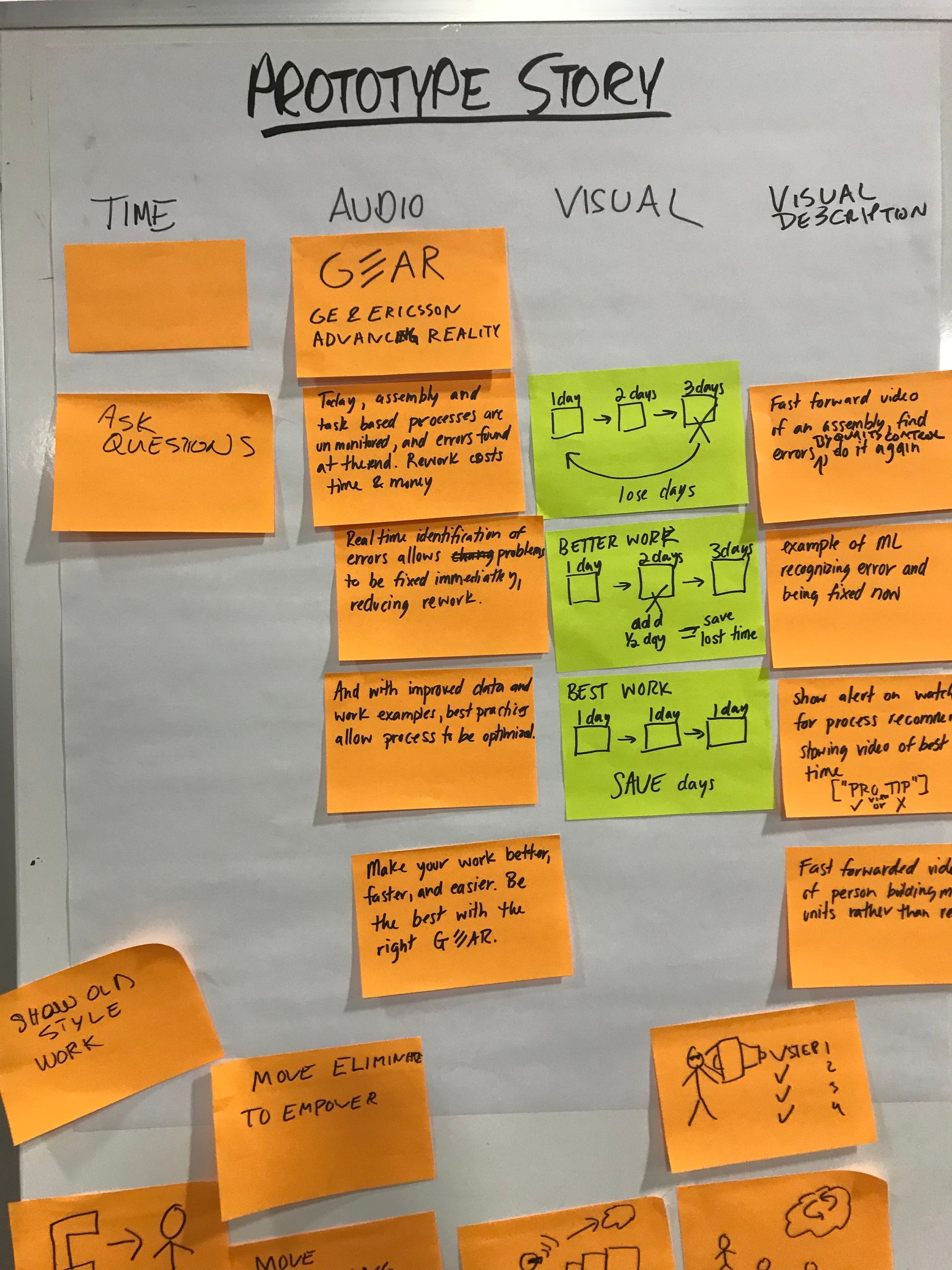
Using Post-It Notes to decide on a prototype’s features, which were then used in real-time to build the prototype.
“This is just a through line now… we’re gonna run through all the stuff—the ‘How Might We(s),’ the affinity mapping—but then we’re going to keep going. The output has shifted.”
For Comedia and other fast-moving agencies, this means workshops are still vital…only when they're completely connected to the work. In this way, workshops are on-ramps to real delivery. The most important question is no longer “Did we follow the framework?” It’s: “What did we make?”
“Boutique agencies are there to get stuff done.” Full stop.
Rather than prescribing design thinking as a separate deliverable, Chris recommends weaving its best parts into the project kickoff…and treating it as a shared launch pad for cross-functional collaboration. The process should clarify direction, energize the team, and lead to real output. Post-its alone won’t cut it.
Insight 3: Design in the AI Era Demands Full-Stack Fluency
Design is changing fast—and AI is speeding up the transformation. For Chris, the role of a designer today isn’t narrower whatsoever! It’s broader and more essential than ever.
“Design now is an expectation of understanding holistically end-to-end what product looks like.”
As Nick Cawthon stated as well, Gone are the days when a designer could operate purely in Figma or Photoshop. Today, successful design requires an understanding of product, context, and implementation. And with AI entering the picture, those who lack fundamentals will struggle to keep up.
“If you don’t know your fundamentals, you are gonna get into real trouble real quickly trying to vibe code your way out of it.”
Chris doesn’t view AI as a threat. But…he sees the hype leading many to overlook what actually makes design work. AI can help you move faster, but without a clear point of view, you’re just generating output…not outcomes.

Comedia created an AI-powered style platform that reimagines the entire shopping journey for Macy’s
“If you don’t know your story, your beats, and how you want the story to end, you’re not gonna get anything cohesive.”
In this landscape, designers must become fluent not just in interfaces but in infrastructure. AI is a powerful tool, but only in the hands of people who know what they’re building and why.
“We use AI every day… as a force multiplier. But it’s never at the pointy end of client work. It’s for ideation, for getting unstuck. Not for replacing design talent.”
To Chris, the rise of AI mirrors earlier shifts, like when designers had to learn HTML and CSS in the early web. The bar is rising again. But the opportunity is rising with it.
“It’s almost like you get one teammate for free. You want a team of three, we’re giving you four. It’s just that one of those teammates isn’t human.” This is all about creating and delivering more value for the client than is quoted in the contract!
The designers who thrive will be the ones who embrace this expanded role: from visuals to vision, from flow to full-stack. Because in the AI era, you don’t just need to make things look good. You need to make them work.
Justin’s Notes
Like many of my conversations with design, products, and strategy leaders, this one started with a casual catch-up. In fact, my catch-up meeting with Chris was actually more like a walk on the beach (no, really).
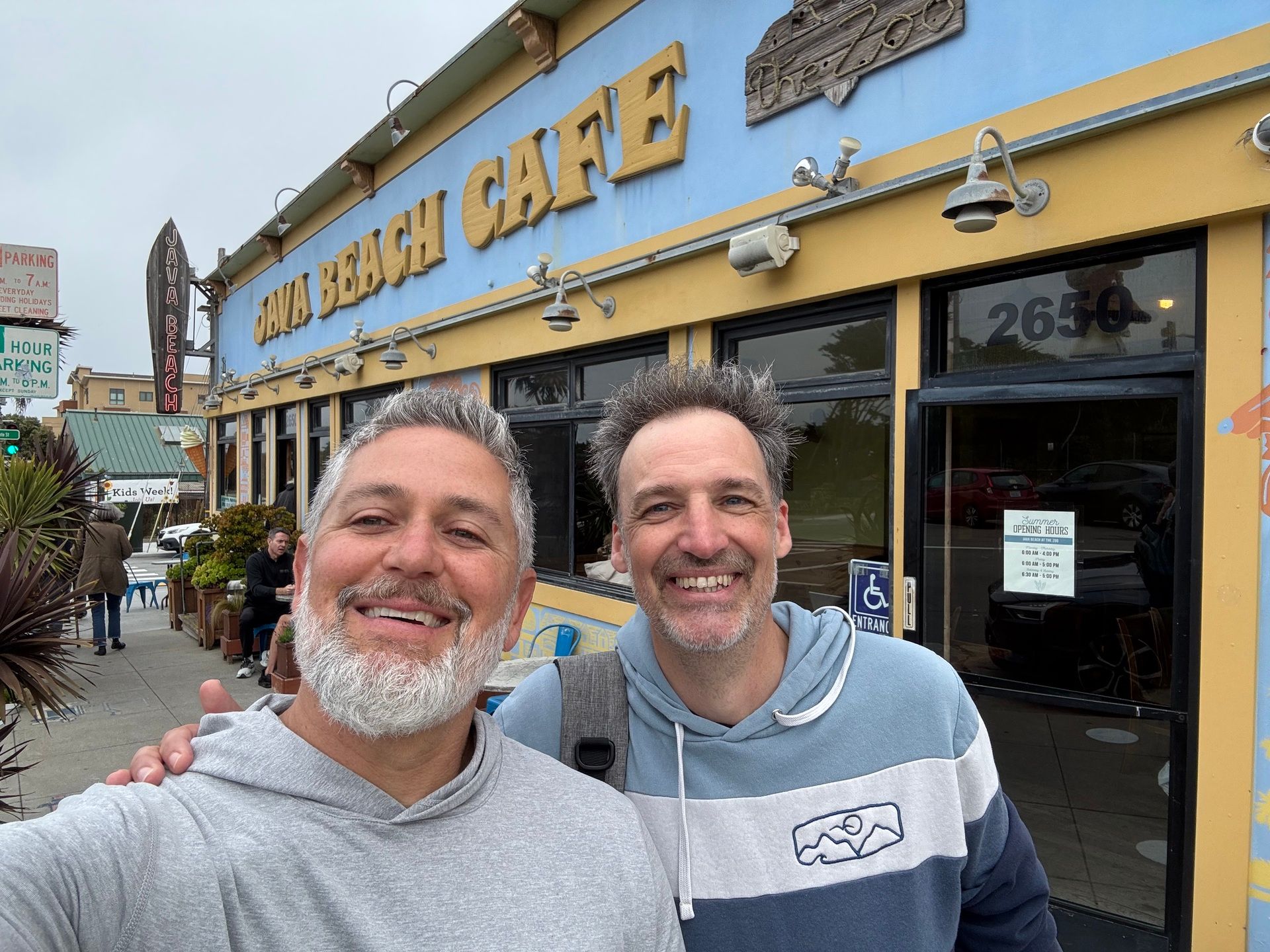
During our walk, we talked about all things consulting, AI, projects, kids, dogs, etc. And…irrespective of the conversation, we kept landing back on the subject of working together to create more impact.
Chris said it well (during our walk and into the mic): “Back in the day, growth at an agency was headcount… I think now it’s about having a core of world-class people and scaling through partnerships.”
I couldn’t agree more.
Consulting, like life, is truly not about the individual. It’s about adding multiplying the skills of more than one person to create something bigger and more valuable than the sum of its parts.
This is true whether two or more boutique firms are working together, or whether freelancers are joining a client team to accelerate or produce something that the client cannot themself.
What’s more, AI in this case is a “force multiplier”. It’s the extra oomph, or perhaps even the extra partner, that makes the whole thing more valuable, nimble, faster, smarter, etc.
And…when you bring all of these parties together, from the Design Strategists/Business Designers, who may kick off with a classic design thinking session, to the designers and engineers, you get something magical, cohesive, and intrinsically more co-creative than a single, large consultancy can bring to the table.
Want more? Connect with Chris and tell him Justin sent you!
Subscribe to Design Shift for more conversations that help creative professionals grow into strategic leaders.
Want to go deeper?
The Comedia team is laser-focused on employing design to move the needle, for both large companies, like Google, Microsoft, Zoom, Macy’s, and many others…but also for startups in need of that 0 to 1 secret sauce.
You can read all about how they do this in their Thoughts section. And…if you’re a founder at a startup, check out Comedia’s Creative Capital offer!

What did you think of this week's issue?
